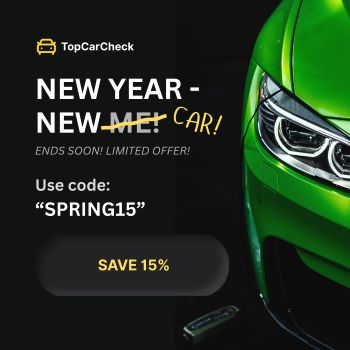Car History Check vs Free DVLA Check - What’s the Difference?

Spring Offer

A free DVLA check is like glancing at a car’s ID card. A full UK car history check is more like digging through the car’s CV, medical records, and bank statements all in one go. Knowing the difference could save you from buying a financial nightmare on wheels.
So, let’s break it down in detail: what does each service give you, which is better for buyers, and how you can use both together to avoid costly mistakes.
What is a Free DVLA Check?
The DVLA (Driver and Vehicle Licensing Agency) runs the UK’s official vehicle register. When you do a free DVLA check, you’re essentially pulling data straight from this database. It’s quick, free, and incredibly useful for basic details.
A DVLA check can tell you:
Car’s make, model and colour
Engine size and fuel type
Current tax status (is it taxed or SORN?)
MOT expiry date
CO2 emissions
When it was first registered
Why it matters:
This info helps you make sure the seller isn’t lying about the basics. For example, if someone claims they’re selling a 2019 Ford Focus but the DVLA says it was first registered in 2015, that’s a red flag.
But here’s the issue: the DVLA doesn’t tell you the full story. It won’t reveal if the car’s been in a serious accident, written off, stolen, or has outstanding finance. And those are the things that could cost you thousands.
What is a Car History Check?
A car history check goes way beyond what the DVLA offers. Think of it as the advanced version - pulling data from multiple sources, not just the DVLA.
A proper car history check from providers like TopCarCheck.co.uk includes:
DVLA details (make, model, tax, MOT)
MOT history (including failures and advisories)
Mileage records to detect clocking
Write-off categories (Cat A, B, S, N)
Police stolen vehicle database check
Outstanding finance (is the lender still the legal owner?)
Previous keepers
Plate changes
Import/export status
Scrapped status
In other words, it answers the crucial question: Is this car safe to buy, or is it hiding skeletons in the closet?
Quick Comparison: DVLA vs Car History Check
Here’s a side-by-side table to make things clearer:
Feature | Free DVLA Check | Car History Check (TopCarCheck) |
|---|---|---|
Make, model, colour | ✅ | ✅ |
Tax status | ✅ | ✅ |
MOT expiry date | ✅ | ✅ |
CO2 emissions | ✅ | ✅ |
MOT history (failures, advisories) | ❌ | ✅ |
Mileage discrepancies | ❌ | ✅ |
Write-off record | ❌ | ✅ |
Stolen check | ❌ | ✅ |
Outstanding finance | ❌ | ✅ |
Number of previous owners | ❌ | ✅ |
Plate changes | ❌ | ✅ |
Import/export status | ❌ | ✅ |
Scrapped marker | ❌ | ✅ |
Why a Free DVLA Check Isn’t Enough
A free DVLA check is a great first step - but it’s nowhere near enough on its own. Imagine buying a car because the DVLA said the MOT was valid, only to later discover:
It’s still owned by a finance company (they could repossess it).
It was written off after a crash and badly repaired.
The mileage was clocked back by 70,000 miles.
It’s flagged as stolen.
Each of these issues could turn your “bargain” into a financial disaster. That’s why a full car history check is essential before handing over cash.
When Should You Use Each?
Free DVLA Check: Use this early in your search to weed out dodgy listings. It’s perfect for confirming basics before you even go see the car.
Car History Check: Always run this before making an offer or paying a deposit. It’s your final line of defence against scams, fraud, and hidden problems.
Real-World Examples
Case 1: The Clocked Car
Tom found a VW Golf listed as “low mileage” on Facebook Marketplace. DVLA confirmed the MOT date, but a full car history check showed the mileage didn’t match past MOT records - it had been rolled back 50,000 miles.Case 2: The Finance Trap
Sarah spotted a BMW at a tempting price. The DVLA showed it was taxed and MOT’d, so she almost went ahead. Luckily, she ran a car history check and found £6,000 outstanding finance. Without that, she could have lost both the car and her money.Case 3: The Stolen Surprise
A used Fiesta looked like a great deal, with clean DVLA info. But a car history check revealed it was on the Police National Computer as stolen. Without that extra check, she’d have ended up losing both car and cash.
Why Use TopCarCheck?
There are many providers out there, but TopCarCheck.co.uk specialises in comprehensive UK car history checks that pull data from trusted sources including DVLA, insurance databases, finance companies, and the police stolen vehicle list.
The difference is peace of mind: a small upfront cost that can save you thousands.
Final Thoughts - The Smart Buyer’s Approach
If you’re serious about buying a used car in the UK, the golden rule is simple:
Start with a free DVLA check to confirm the basics.
Always back it up with a full car history check to uncover hidden risks.
It’s the combination that makes you an informed, confident buyer. After all, a shiny car on the outside can hide some very expensive secrets on the inside.
Buying blind is a gamble - running a car history check is your insurance policy against fraud, debt, and dangerous cars.
Bottom line: Don’t just check a car - history-check it.
Spring Offer

Enter Registration Number
Enter a UK vehicle registration to start your check
Secure checkout via Stripe